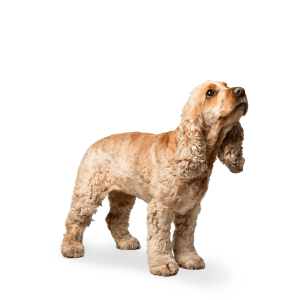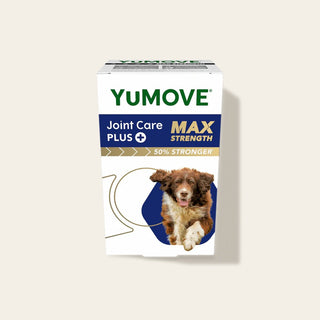

Common dog digestive problems and what to do about them
Digestive issues can be pesky, persistent and hard to pinpoint. As someone who’s worked in the clinical side of veterinary practice, I’m no stranger to how worrying it can be for you as an owner. It’s a common occurrence in the veterinary team to beam with pride when an in-patient passes a normal-looking stool.
This blog post explores the different types of digestive challenges – or ‘Poodicaments’ as we like to call them – their potential causes, and how you can help your pup.
Which ‘Poodicament’ have you been in?
According to a YuMOVE study, 39% of dog owners deal with digestive upsets every month.1 Your dog may have experienced one or more without you even knowing it was linked to gut health. So, let’s look at what to look out for and how you can help your pup.
- Loose stools
Loose poos can be tricky to deal with, especially when you’re out and about! If you’ve ever been faced with them, you’re not alone! 48% of people we surveyed said they’d experienced soft or difficult-to-pick-up poos.1
It’s worth keeping in mind that a sudden change in diet or even a new stressful environment can cause these loose motions. They can also be caused by infections, parasite concerns or food allergies so, if the issue persists, always consult your vet.
As there can be a variety of reasons for loose stools, keeping a packet or two of YuMOVE Digestive Care Rapid in the cupboard will give you peace of mind the next time it happens.
- Inconsistent stools
Inconsistent stools mean you never quite know where you stand with your dog’s bowel movements. They might range from watery to dry. Or they might be frequent or infrequent.
These inconsistencies may be a sign that the intestinal microbiome is unbalanced. The imbalance could be caused by new medication, an infection, dietary intolerances or even a lack of fibre in the diet. If inconsistency is persistent, chat with your vet.
You can help support your dog’s stool consistency by sprinkling YuMOVE Digestive Care Probiotic & Fibre on their food every day.

- Excessive wind
Excessive gas can often be a missed sign of digestive upset and can be pretty unpleasant to live with. You may notice the gas coming shortly after a certain food is introduced, which could indicate a food allergy or intolerance. A build-up of gas can even be a result of wolfing dinners down too quickly. With a multitude of reasons for being excessively gassy, it’s worth keeping an eye on.
You could also consider giving them YuMOVE Digestive Care Pre & Probiotic, which is designed to support dogs with excess wind.
- Scooting or licking bottom area
Scooting is when your dog shuffles their bottom along the floor. Our survey found 24% of dog owners had seen their dog scooting, and 49% didn’t know how to stop it.1 It can happen when their anal glands aren’t emptying by themselves when they go for a poo.
As we know, a lack of fibre can cause stools to become loose or inconsistent, which means the stools are not firm enough to help the glands empty. Other factors that should be kept in mind include obesity, stress, infection, or anatomical differences in the glands. Talk to your vet if the situation persists. Read our guide to the benefits of fibre for dogs.
Giving your dog a supplement such as YuMOVE Digestive Care Probiotic & Fibre, which supports the natural emptying of anal glands, has been shown to reduce scooting and bottom licking.

Supporting the digestive system with YuMOVE
YuMOVE offers a wide range of digestive care supplements for dogs to support digestive health in the long and short term. Here’s a quick recap.
If you’re concerned about your dog’s health, always speak to your vet.
1YuMOVE study, UK dog owners n=200, February 2024.




